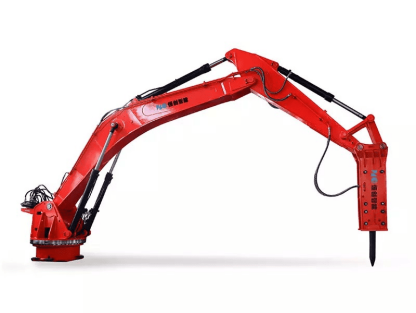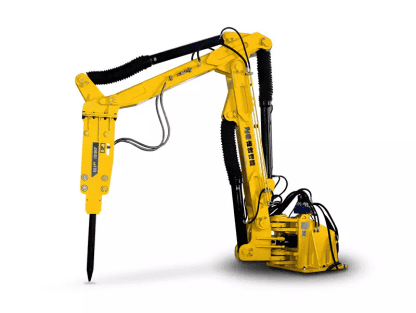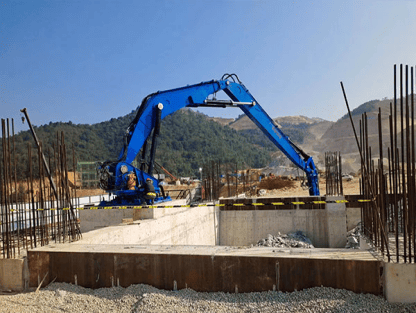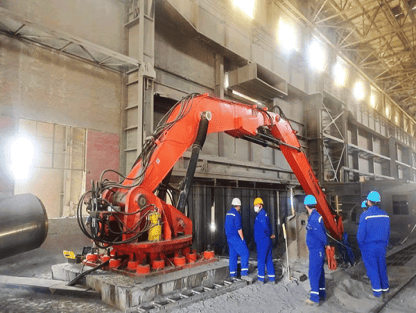
In industries like mining, construction, and quarrying, breaking through hard rock or concrete is a daily challenge. Traditional methods, such as manual hammering or explosives, are often inefficient, dangerous, or impractical. Enter the rockbreaker—a powerful mechanical solution designed to tackle these demanding tasks. Among its variations, the boom breaker (also known as a rock breaker boom, breaker boom, or rockbreaker boom system) stands out as a critical innovation. This article dives into the mechanics, applications, and benefits of boom breakers, along with answers to common questions about these robust systems.
A boom breaker is a hydraulically or pneumatically operated machine mounted on a stationary or mobile platform. Its primary function is to break large rocks, concrete structures, or other hard materials with precision and power. Unlike handheld tools, boom breakers are engineered for heavy-duty applications, offering enhanced safety, efficiency, and durability.
The term “boom” refers to the extendable arm that positions the breaker tool (such as a hammer or pick) directly onto the target material. These systems are often installed on fixed structures like pedestals or integrated into machinery such as excavators (hence terms like rock breaker excavator or robotic breaker).
A typical rock breaker system consists of three main components:
The boom is a heavy-duty, articulated arm made from high-strength steel. It can rotate, extend, and angle itself to reach material in confined or hard-to-access areas. Some booms are stationary (mounted on a pedestal), while others are mobile (attached to excavators or loaders).
Boom breakers rely on hydraulic fluid or compressed air to generate force. The system includes:
A power pack (hydraulic pump or compressor).
Hoses and valves to control pressure.
A breaker tool (e.g., hydraulic hammer, chisel, or pick).
Operators use joysticks, remote controls, or automated software (in the case of robotic breakers) to maneuver the boom and adjust breaking intensity.

Boom breakers are versatile tools used across multiple industries:
Primary Breaking: Fragmenting oversized rocks at excavation sites.
Secondary Breaking: Reducing rock sizes for easier transport or processing.
Blockage Clearance: Unclogging crushers or feeders jammed by large stones.
Breaking concrete slabs, foundations, or reinforced structures.
Tunneling through bedrock for infrastructure projects.
Crushing oversized debris in scrap yards.
Sorting materials in waste management facilities.
Their compact design makes boom breakers ideal for confined spaces in underground operations.

Why choose a rock breaker boom system over traditional methods? Here’s a breakdown:
Operators control the breaker from a safe distance, minimizing exposure to flying debris, vibrations, or collapsing structures.
Boom breakers work faster than manual labor or explosives. They reduce downtime in processes like ore processing or demolition.
The articulated boom can target specific areas without damaging surrounding structures—ideal for delicate demolition work.
While the initial investment is high, boom breakers lower long-term labor and operational costs.
Built to withstand harsh environments, these systems require minimal maintenance compared to handheld tools.

Boom breakers come in various configurations to suit different needs:
Stationary Rock Breaker
Permanently mounted on a pedestal or platform, these are ideal for fixed locations like quarry processing plants.
Mobile Rock Breaker
Attached to excavators or loaders for flexibility in mining or construction sites.
Robotic Breaker
Automated systems controlled via software, reducing human intervention in hazardous zones.
A boom breaker refers to the entire system (boom, hydraulic components, and breaker tool). An excavator-mounted breaker is a type of mobile boom breaker attached to an excavator.
Yes. Most systems are equipped with heavy-duty hammers capable of breaking through rebar-reinforced materials.
Routine checks (e.g., hydraulic fluid levels, hose integrity) are recommended weekly. Major servicing depends on usage intensity but typically occurs annually.
While fully autonomous systems exist, most robotic breakers still require human oversight for safety and precision adjustments.
With proper maintenance, a high-quality system can last 10–15 years, even in demanding environments.
Boom breakers are indispensable in modern heavy industries. By combining power, precision, and safety, they address the limitations of traditional rock-breaking methods. Whether mounted on a stationary pedestal or an excavator, these systems enhance productivity while protecting workers—a win-win for any operation. As technology advances, expect to see more robotic breakers and automated solutions revolutionizing the field further.
For industries grappling with tough materials, investing in a robust rock breaker machine isn’t just a choice—it’s a necessity for staying competitive and safe.